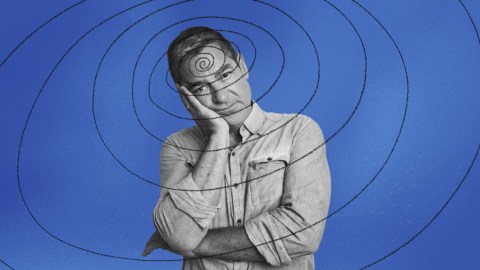Boredom isn’t the enemy; it’s a catalyst for changing your relationship to work.

Key Takeaways
- Most American workers are either disengaged at work or find their jobs miserable.
- Boredom at work isn’t an inescapable mental state; it’s an emotional warning that you need to change your current predicament.
- You can find fascination and reward in your work by entertaining your curiosity or connecting with the meaning behind your job.
Our modern understanding of the relationship between work and boredom developed largely out of the Industrial Revolution. As the demand for factory labor increased, millions of people were forced to perform the same repetitive task for 12 hours a day, day after day, ad nauseam. This seismic shift from the work of centuries past erupted in a boredom epidemic.
In fact, our modern word boredom didn’t originate until the mid-19th century, a combination of bore (one that causes weariness or restlessness) and the suffix –dom (a state of being).
This association is so strong that many consider boredom to be a strictly modern phenomenon. While conditions may have improved, the argument goes, the same through line of soul-crushing efficiency and productivity connects the assembly lines of yesteryear to the Zoom meetings of today. Is it any wonder then that almost half of U.S. workers aren’t engaged at work while a further 15% find their jobs miserable?
Except this argument misses a critical detail: Even our ancient ancestors could get bored with work. No generation has lived in a blissful age in which every mason, philosopher, and turnip farmer has enjoyed the products of their labor as only a true artisan can. They too struggled to find the flow and fascination in their work.
Far from a modern malaise, boredom is a psychological tool that serves a vital evolutionary function. It’s a warning for you to either change your current situation or risk the consequences.

Dancing with the noonday demon
The ancient Greeks may have provided the earliest formal expression of boredom. Their concept of acedia represented a kind of whole-body languidness leading to apathy and self-neglect. Centuries later, early Christian monks would borrow acedia to describe the tedium of monastic work-life. (If you think eight hours in a cubicle sounds like a drag, try devoting all your waking hours to abstinence and prayer.)
But for medieval monks, boredom wasn’t simply a question of unmet performance goals. Feeling weary in the service of the Lord their God was a spiritually fraught prospect. Sloth would be promoted to one of the seven deadly sins, and that deadliness wasn’t hyperbolic. As W.E.H. Lacky noted in his History of European Morals (1920): “A melancholy leading to desperation, and known to theologians under the name of ‘acedia,’ was not uncommon in monasteries and most of the recorded instances of medieval suicides in Catholicism were by monks.”
By the Middle Ages, acedia’s association with sin and ungodliness personified it into a being called the “noonday demon.” This devilish figure would plague people with lethargy and agitation during their daily routines — typically around noon. The demon gets its name from the Old Testament, specifically Psalm 91:6, which implores its readers to not be afraid of “the destruction that wasteth at noonday.”
And this is just one of boredom’s historic pathways. Others include the French, who famously gave the world ennui. The Germans have langeweile, which connects boredom to a lengthened sense of time. The Russians have skuka, a word derived from the onomatopoeia for the sounds chickens make.
Then there’s the sickening boredom the stoic Seneca bemoaned when he wrote: “All things pass that they may return. I do nothing new, I see nothing new. Sometimes this makes me nauseous. There are many who judge living not as painful but empty.”
Yes, even the great Roman philosopher occasionally got fed up with his job.
The key is that we must be self-determined and engage the world on our terms.~ James Danckert & John D Eastwood
Bored inside of your gourd
As this very short history suggests, settling on what boredom is and what it means to experience it has been a vexing problem. Is it a choice, a mood, a state of being, a cultural trait, a mental sickness, or an oddly punctual demon?
While research into boredom is new and unconcluded, the growing consensus considers it an emotion. Like anger, sadness, or happiness, boredom is a complex combination of behavioral and psychological responses to a stimulus or experience. In the context of this article, that experience is work, but it could be anything from seminars to dinner gatherings to that book you just can’t bring yourself to put down.
Also like other emotions, boredom seems to have evolved to engender feelings that prompt us to specific responses. Just as a jolt of fear alerts us to something potentially harmful, or a burst of joy earmarks a rewarding experience, boredom produces feelings of uneasiness and discomfort to inform us that the current situation is not in-line with our desires and drives.
“In this regard, boredom reveals an important aspect of being human: we have a strong need to be engaged with the world around us,” psychologists James Danckert and John D. Eastwood Eastwood wrote in Out of My Skull: The Psychology of Boredom. “For humans and animals alike, the key is that we must be self-determined and engage the world on our terms; we must be free to make choices based on what matters to us.”

Boredom isn’t always the enemy
While boredom is universal, nothing is universally boring. A project one person finds exhilarating, another may find mildly dull, and someone else may find mind-numbing. This is one of many difficulties in studying an emotion like boredom, and psychologists are still identifying its potential sources and various types. One thing they have learned is that not all boredom is bad — even at work.
Just as we can’t be ecstatic all the time, we can’t always be engrossed in every situation. Everyone needs mental and emotional downtime, and boredom can be a rest mode for our brains at the end of a busy day or during a long weekend.
Similarly, everyone has aspects of their jobs they find pedestrian. If the boredom associated with those parts of the job is short-term and low-grade, that’s fine. Maybe even optimal. You can use boredom as a guide, scheduling stimulating work during your energized hours and reserving more tiresome tasks for when you need a break.
“We can’t avoid boredom — it’s an inevitable human emotion. We have to accept it as legitimate and find ways it can be harnessed. We all need downtime, away from the constant bombardment of stimulation. There’s no need to be in a frenzy of activity at all times,” Esther Priyadharshini, a senior lecturer at the University of East Anglia, told The Guardian.
However, when boredom becomes protracted, and self-determination remains out of reach, then our physiological response to it never shuts down. Over time, that constant background drone of dissatisfaction can degrade our mental and physical health.
Chronic boredom has been associated with anxiety, poor nutrition, increased risk-taking, and a loss of attention. It can also produce copious amounts of stress, which is further associated with ailments such as burnout, social withdrawal, and various cardiovascular diseases.
Seeking a new course
So, how do we overcome boredom and motivate ourselves to self-determine and connect with the world on our terms?
Unfortunately, boredom itself can’t answer this question. Just as anger can’t tell you how to make a situation right, and sadness can’t tell you what will make you happy, boredom only lets you know that you need a change from the monotony. After that realization, it’s up to you how to proceed.
“We need to be engaged, mentally occupied, giving expression to our desires and exercising our skills and talents. In short, we have a need for agency. When this need is fulfilled, we flourish. When this need is thwarted, we feel bored, disengaged,” Danckert and Eastwood write.
Although how you exercise your skills, talent, and agency is up to you, psychologist Dan Cable has some recommendations for where to start.
Subscribe for counterintuitive, surprising, and impactful stories delivered to your inbox every Thursday
Fields marked with an * are required
First, dedicate more time to working on projects that either allow you to experiment or play toward your strengths. Both arouse your curiosity and trigger your brain’s reward system.
A key cranial player is the ventral striatum, a cluster of neurons located in the forebrain. The ventral striatum helps our brains process rewards and motivation by releasing the feel-good neurotransmitter dopamine. Specifically, Cable notes, the ventral striatum triggers a dopamine outpouring when we experience something novel or challenging. For this reason, he refers to it as the brain’s “seeking system.”
“This system is urging us to explore the boundaries of what we know. It’s urging us to be curious,” Cable said in an interview. “And, by the way, I mean innately. Evolutionarily, this system was developed to keep us learning.”
Cable also advises you to try to connect more strongly to the meaning behind your work. He points to research by psychologist Adam Grant to demonstrate the boredom-stamping power of meaning.
Grant took university call center workers and separated them into two groups. The first group (the control) worked their typical shifts. Meanwhile, the second group was provided an extra 15-minute break to speak with university students. The students thanked them for their service and discussed how their efforts gave them the opportunity to attend university.
Grant found that the second group had more energy, grew more engaged, and raised more money compared to the control. In discovering the meaning of their job, they found it more purposeful, and their connection to it grew.
“For humans, this idea about identity and what is my potential and what am I capable of while I’m on the planet, that seems to be something that is an ignition switch. It makes us enthusiastic to try. It makes us want to pursue the potential that we have within us,” Cable said.
That doesn’t mean we’ll never grow bored at work. Even the best of us will feel jaded at a bad day or tedious task. But if we can tap into our curiosity, meaning, and agency, we can better weather those dull storms or find enjoyment in work.



